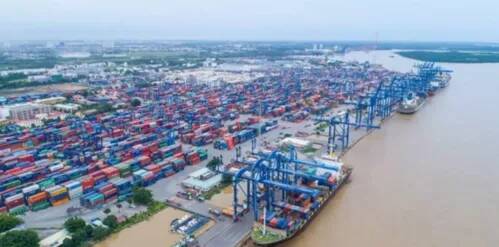More than 10 tons of coffee beans and pepper cargo were stolen from the port! Vietnam's coffee trade credibility declines
Vietnam is the world's largest exporter of pepper and the world's second largest exporter of coffee. Recently, due to the impact of El Ni ñ o, Vietnam has been hit by drought. Although Vietnam entered the rainy season in May, the rainfall is not enough to alleviate the loss of crops caused by the drought.

As a result, in the first five months of 2024, Vietnam's pepper exports reached 114400 tons, down 13.2% from the same period last year, but pepper exports reached US $493 million, up 20.6% from the same period last year.
As a result of the decline in Vietnamese coffee production, coffee exports have also fallen at the same time. According to Vietnamese customs data, Vietnam exported 79358 tons of coffee in May 2024, down 47.8 percent from the previous month, while in the first five months of this year, Vietnam exported a total of 817514 tons of coffee, down 5.8 percent from the same period last year. This also makes the current price of coffee high. In Vietnam, the purchase price of coffee ranges from 118 million to 120 million dong / ton.
Recently, however, export goods such as pepper and coffee were stolen at the port of Geelai, Vietnam, resulting in a reported loss of 19 tons, including 10.3 tons of coffee beans and 8.2 tons of pepper (worth about 2.7 billion dong).

According to reports, the Vietnam Pepper and spices Association (VPSA) said that the theft began in September 2023 and continues to this day, with a total of eight shipments lost, including four batches of pepper and four batches of coffee beans belonging to five companies. The loss of goods accounted for 7-28% of the freight volume, all of which occurred in the unloading area of Gillay Port, with a total of 19.2 tons of cargo, and the largest loss was more than 4.6 tons of coffee beans.
The enterprise that lost the goods said that after the lost goods were delivered to the foreign partner and received the notification from the partner, the Vietnamese enterprise began to conduct an internal investigation. The preliminary results show that the container weighing order loaded by the factory is consistent with the weighing order when entering Gillay Port.
As a result, many merchants suspect that the goods were lost when the containers were unloaded at Gillay Port waiting for export. However, Xigong Xingang, the company in charge of the port, believes that the process of moving goods from the seller's warehouse to the buyer's warehouse must go through several stages in the supply chain, such as sea transport, to the port of discharge, and from the port to the importer's warehouse. Therefore, it must be verified to avoid misunderstanding and affecting the reputation of the company.
With regard to this incident, VPSA believes that the loss of goods will cause Vietnamese exporters to compensate or fine their partners, cause direct financial losses to the enterprises, and indirectly affect the future contracts of the exporters.
And, at present, Brazilian coffee has entered the harvest period, Brazil Robusta coffee harvest progress of 51%. Recently, Brazil's Robusta exports have been increasing, alleviating many vacancies due to reduced coffee production in Vietnam and Indonesia, as well as the Red Sea crisis affecting Eurasian routes. as a result, many traders have turned to buying Brazilian Robusta coffee beans.
Not only that, Vietnam's coffee trade was defaulted earlier because coffee farmers were unwilling to sell coffee beans, and in addition to this port incident, the reputation and image of traders and enterprises as well as Vietnam will also decline in the international market, which is not conducive to Vietnam's economic development.
Important Notice :
前街咖啡 FrontStreet Coffee has moved to new addredd:
FrontStreet Coffee Address: 315,Donghua East Road,GuangZhou
Tel:020 38364473
- Prev

Again! Again! Manner's clerk was injured by a customer!
▲ Click to pay attention| Daily Boutique Coffee Culture Magazine Coffee Factory exposed conflicts between employees and customers at two Manner stores yesterday. Several Manner-related terms hit hot searches, causing widespread discussions from all walks of life. At the same time, a relationship with Manner appeared on social media
- Next

Take the young man! Guming's first store in Shanghai opened 5000 cups of milk tea within 2 minutes?!
▲ Click to pay attention| Daily boutique coffee culture magazine Coffee Factory milk tea brand and popular IP co-branding can be said to be a common promotion nowadays. A joint event can have a certain promotion effect on the popularity of both brands. Chain brand Gu Ming and many fans The limit of the game IP "Love and Deep Space"
Related
- What grade does Jamaica Blue Mountain No. 1 coffee belong to and how to drink it better? What is the highest grade of Blue Mountain coffee for coffee aristocrats?
- What are the flavor characteristics of the world-famous coffee Blue Mountain No. 1 Golden Mantelin? What are the characteristics of deep-roasted bitter coffee?
- Can I make coffee a second time in an Italian hand-brewed mocha pot? Why can't coffee be brewed several times like tea leaves?
- Hand-brewed coffee flows with a knife and a tornado. How to brew it? What is the proportion of grinding water and water temperature divided into?
- What is the difference between Indonesian Sumatra Mantinin coffee and gold Mantinin? How to distinguish between real and fake golden Mantelin coffee?
- What does bypass mean in coffee? Why can hand-brewed coffee and water make it better?
- Unexpected! Ruixing Telunsu lattes use a smoothie machine to foam milk?!
- % Arabia's first store in Henan opens into the village?! Netizen: Thought it was P's
- Does an authentic standard mocha coffee recipe use chocolate sauce or powder? Mocha Latte/Dirty Coffee/Salty Mocha Coffee Recipe Share!
- What is the difference between Vietnam egg coffee and Norway egg coffee? Hand-brewed single product coffee filter paper filter cloth filter flat solution!

